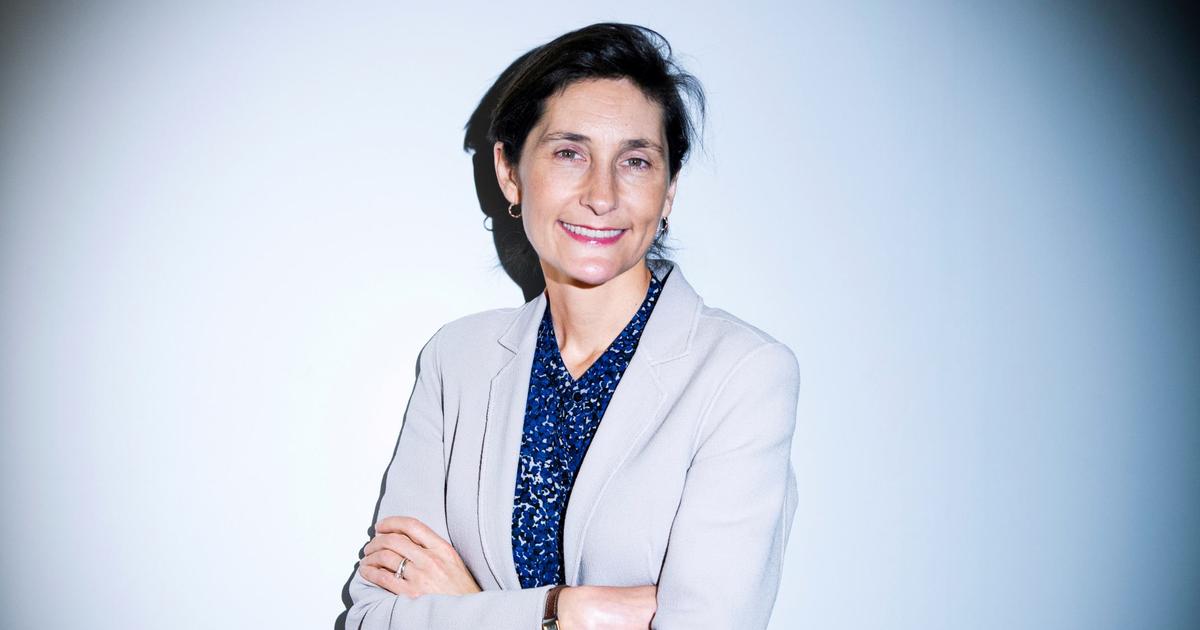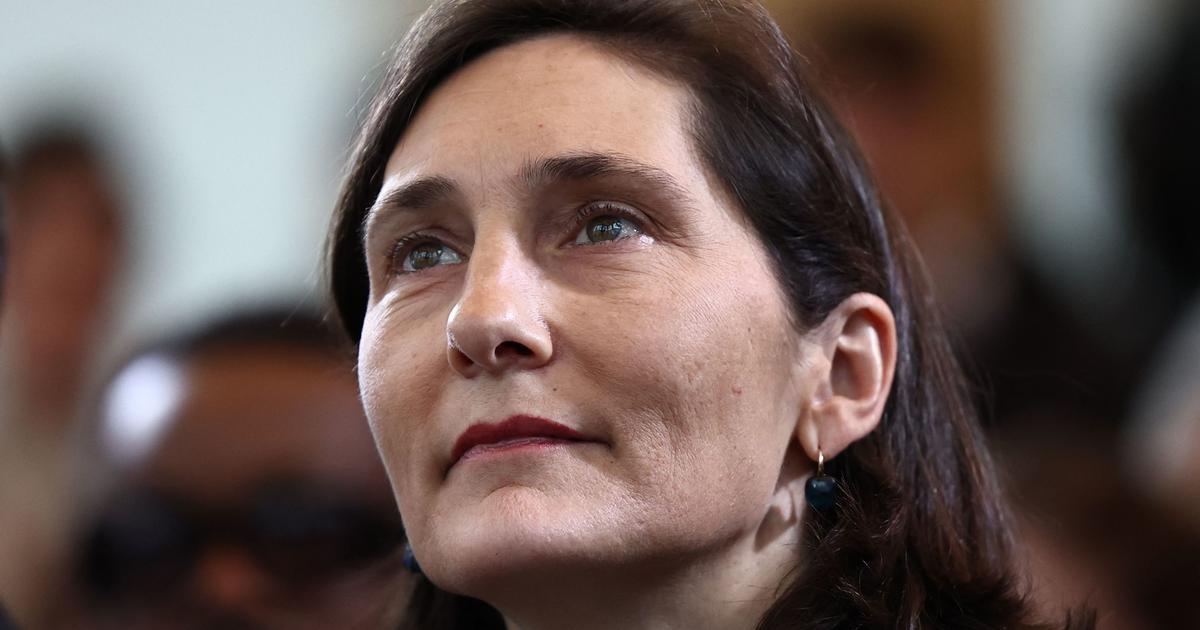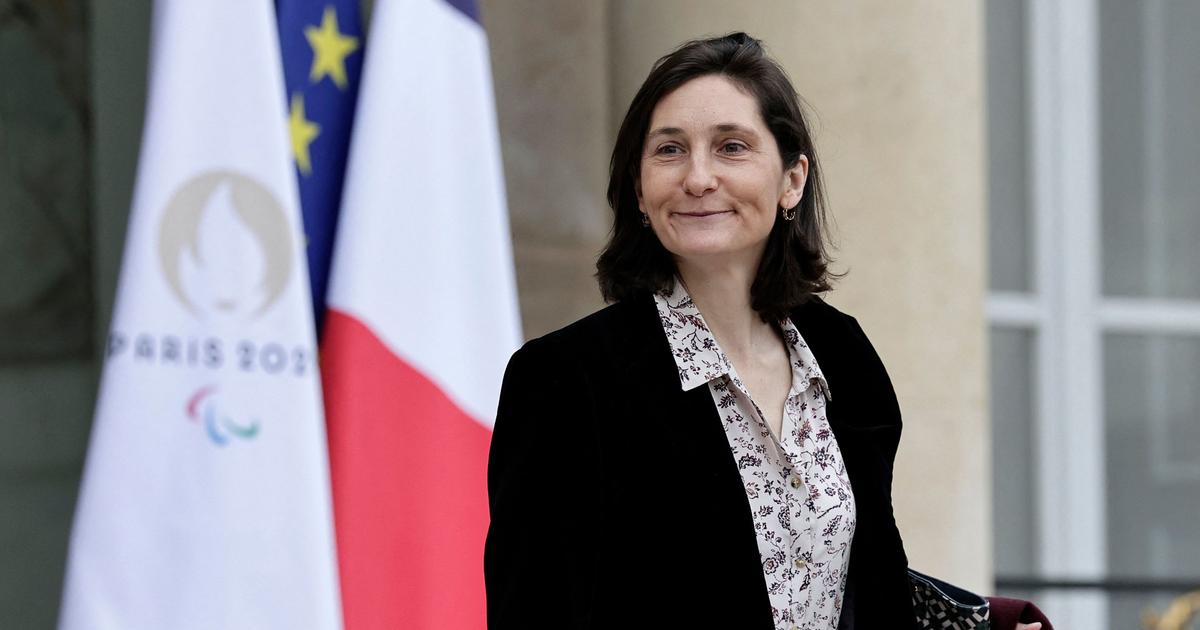The first year of his mandate, which began on May 20, 2022, has been dense and electric. Faced with two (now ex) presidents of powerful federations, rugby and football, dismissed for serious governance errors, Amélie Oudéa-Castéra has never wavered. Putting sport at the heart of French society is its guideline, which also imposes a fight for its ethics. His office on the 6th floor of a large glass building is a surprisingly soft and wooded place, from where you can see this renovated part of the thirteenth arrondissement of Paris, which runs along the left bank of the Seine. Rows of colorful files chant the various missions of the minister, Olympic and Paralympic Games of summer 2024 in mind. Behind his desk, a yoga mat, which the counselor assures is used daily twenty minutes. The minister extends her hand, in jeans and flat shoes, very smiling, very precise too. A gifted tennis competitor as a teenager, a brilliant student, she invested fifteen years in corporate life before this full-fledged political position. The Games occupy him today "40% of the time, it will be 80% in the coming months," adds his advisor. An assumed exposure for a woman who likes to take risks.
In video, Paris Hilton launches the Paris 2024 Olympic Games with an ad: "It's hot"
Mrs. Figaro. – Loaded with multiple files, you are bound by a relentless calendar that leads to the opening of the Olympic and Paralympic Games (JOP), on July 24, 2024. This is an unprecedented responsibility. How does this countdown impact your strategy and energy?
Amélie Oudéa-Castéra. – This countdown obliges us, and I constantly have in mind the feeling of the scarcity of time. My roadmap revolves around three pillars. First, there is the organization of these major events that are the Olympic and Paralympic Games, but also the Rugby World Cup, starting September 8. Then, there is the desire to put sport more at the heart of our society, so that it has a better impact on young people, allows everyone to be healthier and finally serves professional integration and inclusion in the face of disability. This presupposes equipment, territorial development, practice in a professional environment, and therefore partnerships with local elected officials and companies. Finally, I would like to enhance the value of our high-level athletes, strengthen the governance of sport, and make it more accountable. Behind this word, I put both ecological transformation and the fight against all forms of violence, especially sexist and sexual.
Read alsoVahine Fierro, professional surfer: "I hope we will amaze people at the Olympics"
What makes the JOP the right springboard? Why did it take so long?
I wouldn't say we had to wait, but yes, the Games are an accelerator. We have a historic responsibility, and if with the momentum of the Games we do not manage to move the lines, we will have missed something important, and society with us. Let me give you two concrete examples. Paralympic athletes around the world will put on a dazzling show. This is, I believe, an unprecedented opportunity to allow society as a whole to change its outlook. I am also thinking about school. Great athletes know how to put stars in the eyes of our children. However, the latter now suffer from a sedentary lifestyle, an addiction to screens and increasing risks of obesity. A study by ANSES (National Agency for Food, Environmental and Occupational Health and Safety, Editor's note) shows that two-thirds of our children and adolescents are at high health risk (overweight, eating disorders, altered sleep, etc.). These Games really offer us the opportunity to push sport as a tool for emancipation, discipline and the possible commons.
We have a historic responsibility, and if with the momentum of the Games we do not manage to move the lines, we will have missed something crucial.
Amélie Oudéa-Castéra, Minister of Sport and the Olympic and Paralympic Games
According to many studies, schoolyards remain very gendered: boys at the center, girls on the margins. How can we reinvent them?
The statistics on this subject are edifying. Boys in a playground take a third of steps faster than girls! They occupy the large spaces, where girls, in more confined areas, spend less. We invested one million euros to work on active design in 200 schoolyards. It is a question of setting up XXL hopscotch, reserving spaces for skipping ropes, painting, why not, in pink the football fields ... In short, to attack gender stereotypes. Today, our women's football team shines, there is no reason to think that an 8-year-old girl cannot excel at football and take immense pleasure in it. If you want a strong women's France team, it starts in the playground.
You have generalized, with Minister Pap Ndiaye, thirty minutes of daily physical activity in primary school, two hours of sport in college. Girls play less sport than boys: how to catch up?
In the 3rd grade, a third of our teenage girls no longer play sports, at least in a traditional practice. They drop out because their bodies change, because the gaze of others weighs. That's why we need to recreate spaces where teenage girls feel more liberated, practice with girlfriends, without evaluation or competition. These two extra hours, we must organize them in partnership with sports clubs, to which we ask to invent a more fun offer, with urban sports, breaking, Pilates or yoga, and educators paid by the Ministry of Sports. This requires letting the students escape from the establishment to find, at the club, a certain happiness to move.
In the third grade, a third of our teenage girls no longer play sports, at least in a traditional practice.
Amélie Oudéa-Castéra, Minister of Sport and the Olympic and Paralympic Games
By "girlfriend spaces", do you mean single-sex groups?
Rather to an offer that will evolve à la carte. The possibility of mixing, between girls and boys, between able-bodied children and those with disabilities, must obviously continue; As can exist the choice to do sports with girlfriends. Not feeling judged is decisive. As we can see, it only takes mockery for a student to ask for a PE exemption, and that's it. I no longer want teenage girls to drop out of sports because, at one point, they suffered from the gaze of others.
You were a tennis champion as a teenager. Does what we evoke awaken memories?
These are things that I have experienced, weight gain for example, and that may have been difficult. In tennis, I was a very precocious child, with a head start between 10 and 15 years old. Then at 16-17 years old, because of personal difficulties and a progression that slows down a little, I experienced these moments when you become more vulnerable. When you earn a little less, the look of others changes. From invincible, you become more fragile, crumbly. You have to deal with jealousies, pressure if you lose ground... Admittedly, it was on the scale of high-level sport, a different world from the college yard. But adolescence remains a pivotal moment for young people and I am very attentive to it.
Why does our country, unlike the Scandinavians or the Anglo-Saxons, still oppose sportsmen to intellectuals?
The France values culture and its artists, values athletes for their achievements, but does not see the blossoming combination of an intellect that functions well in an active body. We are too cerebral, caught up in the idea that sport is reserved for enthusiasts. Physical activity and sport is our lifestyle. You know how post-Covid, mental health disorders have worsened among students. 40% of them do not play sports. With Sylvie Retailleau, Minister of Higher Education and Research, we want to work with universities on a broader and more diversified offer for them. But I also absolutely want to allow our high-level athletes to keep as long as possible a training, a background of studies, so that they do not put themselves at risk and continue to capitalize on the openness that apprenticeship gives. I give you this testimony: my worst year on the circuit is the one where I gave myself a sabbatical year. I was 17 years old, my baccalaureate in my pocket, my parents accepted. But how much I missed my studies! I was dry, I only had my tennis. And when, for example, I found myself in the depths of the Czech Republic to play a tournament, when I lost my match on a Tuesday night, then remained all weekend without anything in my life to bounce back, entertain myself, tell myself that I had other strings to my bow to develop. I absolutely want, in my mandate, to move the lines on this subject.
We are too cerebral, caught up in the idea that sport is reserved for enthusiasts. Physical activity and sport are our lifestyle
Amélie Oudéa-Castéra, Minister of Sport and the Olympic and Paralympic Games
What values do you keep from this childhood of champion?
My driving force has always been the desire to progress, to understand, to improve the gesture, the work, the project, to build something that ultimately we can be proud of. This engine is constant, even in my managerial methods, and I have applied it to different objects: sport, first, public affairs, then, at the ENA and then at the Court of Auditors, and the company, of which I have always been curious, probably by family atavism – my mother was HR Director of large private groups – and where I spent nearly fifteen years. It was a pretty fantastic trip, from which I took away a lot.
" READ ALSO Rima Abdul Malak: "To look at the future, we must draw on the strengths of the past"
And your arrival in politics?
When Emmanuel Macron comes to power, I have the desire to help him put at the heart of society all that sport brings exceptional. It brings together a thousand learnings and a thousand difficulties, but brings children and adolescents a unique educational treasure. I won't give up on that. I carry this conviction. On the other hand, every time I make a field visit to children with disabilities, as recently in Clamart with the President of the Republic or in the Val-d'Oise in an inclusive club with the first lady, I hear strong testimonies from children, parents, educators, on the self-confidence, maturity and appeasement that sports practice provides to children who share it, able-bodied and disabled. The last element, finally, is insertion. Sport can be a fantastic springboard for marginalised young people to find their bearings. When you have to be at the gym at 16 p.m., and not 16:40 p.m., obeying the instructions of the sports educator, you reframe yourself. Sport also allows recruiters to identify talents and soft skills. This is the purpose of the 200 "Du stade vers l'emploi" operations that we have carried out with local missions and Pôle emploi. On all these aspects, youth, well-being, inclusion and integration, sport is an extraordinary tool.
Sport provides children and adolescents with a unique educational treasure
Amélie Oudéa-Castéra, Minister of Sport and the Olympic and Paralympic Games
Youth, well-being, inclusion, integration, your words are committed. However, this winter, you had to fight with a former president of the French Football Federation over 80years old, Noël Le Graët, who was neither in inclusion nor in well-being...
I arrive at this ministry and quickly face a series of crises that I had not anticipated. They were there, they had to be managed. And learn from it. This is the third pillar of my roadmap, which I mentioned in my introduction: improving governance within the French sports movement. This involves the implementation of the law of 2 March 2022, which already imposes greater democracy within clubs, parity objectives in governing bodies and transparency obligations (extension of the obligation to declare assets and interests, editor's note). To go further, I set up a committee for ethics and democratic life, which I entrusted the co-presidency to Marie-George Buffet and Stéphane Diagana (the Minister of Youth and Sports from 1997 to 2002 and the world champion of the 400 meters hurdles in 1997, editor's note).
Why Marie-George Buffet?
Our beliefs about the societal power of sport bring us together. I knew that she was a woman who would tell me the truth, with a demanding and sincere look; remained close to elected officials and the local associative fabric, especially in the heart of Seine-Saint-Denis. When 80% of the investments of the JOP concern this department, it makes sense. Marie-George Buffet is from another political side, and we work in a transpartisan logic, as for the JOP with Anne Hidalgo, Valérie Pécresse and all the elected representatives in the territories.
What is the mission of this committee?
I ask him to identify ways to strengthen ethics in sport, to improve the democratic vitality of our federations. I also want better protection for practitioners against sexist and sexual violence, anti-LGBT discrimination or fan violence in stadiums. The committee will report in November.
You seem intractable. What do you feel invested in?
Sport loses credibility if it loses its integrity. You can't tell parents "see how great sport is for your kids" if they are threatened with sexual touching in the locker room. We cannot say to children or parents "confront the competition, you will see, the sense of surpassing is great" if they are beaten or insulted by an educator as soon as they lose a match. Sport cannot be said to be great for the well-being of women if, in reality, they feel that there is a sexist discourse here and that their share remains 20% lower in positions of responsibility. My admiration for sport, my faith in its possible impact, must never be undermined by these failures.
I ask the Committee for Ethics and Democratic Life to identify ways to strengthen ethics in sport, to improve the democratic vitality of our federations.
Amélie Oudéa-Castéra, Minister of Sport and the Olympic and Paralympic Games
So we put forward female role models, we better protect girls in clubs... But when are boys educated?
By being extremely firm on the fact that a certain number of words do not have to be spoken and that the victims must be listened to. We have work to do to enforce the obligation enshrined in the penal code to denounce the facts we witness, and to ensure that each actor – judicial, administrative with the prefect and disciplinary with the sports movement – takes coordinated measures. If the courts take a restraining order against an educator, no club should employ him anymore. It is necessary to sensitize the whole chain, including parents, to better detect the signs of a malaise in a child.
For you, what will the post-Games look like?
My eyes are on September 8, 2024, when the Paralympic Games close. On that day, I want us to say that we have succeeded in organizing these Games well, that our athletes have won medals, that we have mobilized the French people and positioned the legacy of the Games, by placing the practice of sport at the heart of society. Then I will have a feeling of great coherence and freedom with my head held high. And I honestly don't know what happens next. As you said, this countdown is relentless. As we speak, we have 444 days left. An absolutely huge project awaits us. And I want us to succeed.









